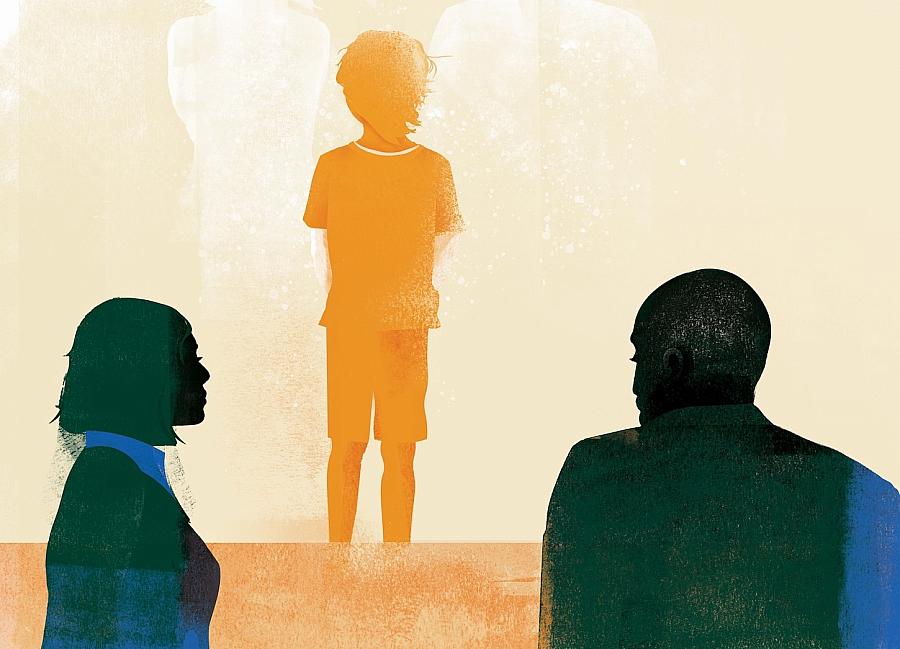What I learned while covering equal shared parenting in child custody cases

(Illustration by Annelien Smet via Sushma Subramanian)
When I set out to write about how 50-50 custody laws affect families, I knew that I had to handle the personal stories people shared with absolute care. Not only did each member of a couple have a different interpretation of events, but the children would also be affected by the version of the story I told. There were many competing values to juggle.
I initially landed on the couple I profiled in The Washington Post Magazine story because the father in that case had been an advocate for 50-50 parenting. When we met in person, it became clear that it was a highly complicated story and would highlight many of the challenges inherent in these custody arrangements, including abuse. But to tell that story honestly story would require trust.
After our first in-depth conversation, this interview subject became nervous, which of course made sense. Not everyone would agree to share one of the most harrowing experiences of their lives with the public. He asked me what I would say if he or his ex-partner didn’t want to be in the piece. While not my usual answer, in this case I told him he could drop out. And I meant it.
Of course, I also told him I hoped he wouldn’t. By that point, I’d flown to Kentucky to meet him and was already committed to my media outlet. I reassured him that my purpose wasn’t to vilify anyone but to show how the interpersonal dynamics that can occur when a family breaks up can be hard on children, especially if they’re constantly going between the two homes.
(When I talked to some of my fellowship class about whether they’d take the same approach with sourcing as I did, many of them said they wouldn’t. But I’m glad I gave my sources the power to speak for themselves without being beholden to me.)
Ultimately, he and his ex-partner decided to continue to participate in interviews. I continued to maintain trust along the way. I interviewed the father and mother separately, and then I fact-checked details of the narrative with the other party. When I had a first draft, I got on the phone with each of them and paraphrased every sentence of the piece out loud so there would be no surprises.
This is far more checking and double-checking than I typically do with sources, but this story struck me as different from others I’ve done. First, it was about such personal matters. Second, they’re private people and I wanted to show them my process along the way, unlike more public-facing people who know how the media works. Finally, I thought about the well-being of their daughter, who would one day read the article.
Source relationships were everything for this story because quantitively it was a very tough story to tell. There are not very good statistics on outcomes of custody cases. We don’t really know if fathers or mothers are most likely to get the kids or why. We don’t have a clue what percentage of time each parent gets or what the reason is. This is too bad because it’s crucial information for developing good policy.
The trouble with writing about shared parenting in general is that the discussions about it tend to boil down to ideology, largely because of this roadblock to getting accurate information. Though the topic is hotly debated by social scientists, family law professors, psychologists, policy makers and the general public, more research is needed on how it truly affects the well-being of both children and their parents.
We don’t know, for instance, why shared parenting appears to be beneficial for some families and not others, or why some couples seem to experience animosity during a custody dispute that dissipates and others’ personal problems are more longstanding and complicated, affecting their children. It’s a challenge for anyone to develop an objective, informed opinion about 50-50 parenting, and I did my best to try.
Every family is different, I had to remind myself as I did my interviews. Originally, I had some other families in the story, but ultimately, they were edited out so we could focus on a single case. I think it was the right decision, and it was important to write about them in as detailed and nuanced way as possible so I didn’t fall into the same polarizing ideological habits as some of the experts I talked to.

